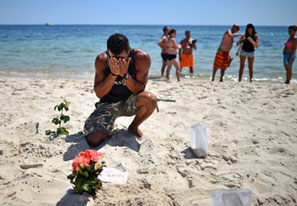
The attack on a tourist beach in Tunisia, which left 38 tourists dead, had a certain logic from the Leninist as well as from the Islamist point of view. The worse the better, said Lenin: the worse being the wretchedness of the condition in which people were forced to live, the better being the revolution consequent upon those conditions.
Tunisia is largely dependent economically on its tourist industry, which had already been much affected by political upheavals of the Arab Spring and the attack in March on the Bardo Museum that left 22 tourists dead. Arrivals from France, the most important market for Tunisian holidays, were already down 65 percent from the previous year; tourists like sun, sea and sites, but not at the cost of their lives.
Finally, a reason to check your email.
Sign up for our free newsletter today.
Tourism can survive a dictatorship such as that of Zine El Abidine Ben Ali, who ruled the country until 2011, but not a democratically elected government that cannot guarantee security. This attack will therefore achieve two goals for the Islamists: it will make the government more repressive, but in all likelihood ineffectually so, thus earning it the hatred and disdain of the populace. And it will cause severe damage to the Tunisian economy, rendering the economically desperate more likely to listen to extremists and believe that Islamism is a solution to their problems. When chaos comes, people prefer anyone or anything that can re-impose order; where there is anarchy, the most ruthless get to rule. And no one can deny the Islamists their ruthlessness.
Whether or not a connection can be proved between the beheading in France and the attacks on a Shia mosque in Kuwait that were done on the same day as the butchery in Tunisia, few people will resist the idea that they were connected, ideologically if not organizationally, and that such terrorists pose a worldwide threat.
In the immediate aftermath of the attack in Tunisia, the British Prime Minister (whose compatriots were the most numerous among the dead), David Cameron, made a statement in which he reiterated, among other things, that Islam was a religion of peace. He was under no pressure, except that of his own pusillanimity, to say any such thing, which is in flat contradiction both to history and to the state of the world today. President Abdel Fattah el-Sisi of Egypt would not have said anything as stupid or as cowardly.
Supposing that, after the attack on the church in South Carolina by Dylann Roof, someone had said, “This had nothing to do with real racism; real racists are peace-loving people who would never dream of such an attack. All they want is a peaceful world in which whites rule and blacks know their place as racial dhimmis.” What would we think of such a person? What would we think of the implication that, even were it not for his racist ideology, Dylann Roof would still have attacked the church and killed nine people? It is indeed the case that most racists do not attack black churches—otherwise, such attacks would be far more numerous than they are. But to say that Dylann Roof was not motivated by his racism would be absurd.
At the very least, leadership should not knowingly propound blatant untruths. Of course it is true that most Muslims are peaceful and want to get on with their lives; the same is true of almost everyone, including Marxists. It is blatantly obvious that not all terrorists are Muslim; but when they are Muslim, their religious ideas are a necessary precondition of their acts.